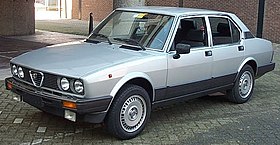Alfa Romeo GTV6
| Alfa Romeo Alfetta | |
|---|---|
| Overview | |
| Manufacturer | Alfa Romeo |
| Production | 1972–1987 |
| Assembly |
|
| Body and chassis | |
| Body style | 4-door saloon 2-door coupé |
| Layout | Front-engine, rear-wheel-drive |
| Related |
Alfa Romeo Giulietta (116) Alfa Romeo Alfa 6 FNM-Alfa Romeo 2300 |
| Powertrain | |
| Engine |
Twin Cam I4 (gasoline) Alfa Romeo V6 (gasoline) VM Motori I4 (turbodiesel) |
| Dimensions | |
| Wheelbase | 2,510 mm (98.8 in) (Berlina) 2,400 mm (94.5 in) (GT) |
| Alfa Romeo Alfetta | |
|---|---|

1983–84 Alfetta Quadrifoglio Oro
|
|
| Overview | |
| Also called | Alfa Romeo 159i Alfa Romeo Sport Sedan |
| Production | 1972–1984 |
| Designer | Giuseppe Scarniti |
| Body and chassis | |
| Class | Executive car |
| Body style | 4-door saloon |
| Powertrain | |
| Engine | 1.6 L I4 (gasoline) 1.8 L I4 (gasoline) 2.0 L I4 (gasoline) 2.0 L VM80A I4 (turbodiesel) 2.4 L VM81A I4 (turbodiesel) |
| Transmission | 5-speed manual 3-speed ZF automatic |
| Dimensions | |
| Wheelbase | 2,510 mm (98.8 in) |
| Length | 4,280–4,385 mm (168.5–172.6 in) |
| Width | 1,620–1,640 mm (63.8–64.6 in) |
| Height | 1,430 mm (56.3 in) |
| Chronology | |
| Predecessor | Alfa Romeo 1750 and 2000 |
| Successor | Alfa Romeo 90 |
|
|
|---|---|

Alfetta GT 1.6
|
|
| Overview | |
| Also called | Alfa Romeo Sprint Veloce |
| Production | 1974–1987 |
| Designer | Giorgetto Giugiaro/Centro Stile Alfa Romeo |
| Body and chassis | |
| Class |
Grand tourer Sports car |
| Body style | 2-door fastback coupé |
| Powertrain | |
| Engine | 1.6 L I4 (gasoline) 1.8 L I4 (gasoline) 2.0 L I4 (gasoline) 2.0 L I4 (turbo gasoline) 2.5 L V6 (gasoline) 3.0 L V6 (gasoline) 2.6 L V8 (Autodelta) |
| Transmission | 5-speed manual |
| Dimensions | |
| Wheelbase | 2,400 mm (94.5 in) |
| Length | 4,190–4,260 mm (165.0–167.7 in) |
| Width | 1,664 mm (65.5 in) |
| Height | 1,330 mm (52.4 in) |
| Kerb weight | 1,110 kg (2,447 lb) (GTV 2.0) 1,210 kg (2,668 lb) (GTV6 2.5) |
| Chronology | |
| Predecessor | Alfa Romeo 105/115 Series Coupés |
| Successor | Alfa Romeo GTV (916) |
The Alfa Romeo Alfetta (Type 116) was an executive saloon and fastback coupé produced by the Italian manufacturer Alfa Romeo from 1972 to 1987. It was popular due to its combination of a modest weight with powerful engines, selling over 400,000 units until the end of its production run.
The Alfetta name (Little Alfa in Italian) came from the nickname of the Alfa Romeo Tipo 159 Alfetta, a successful Formula One car which in its latest 1951 iteration paired a transaxle layout to De Dion tube rear suspension, like the modern saloon.
The Alfetta introduced a new drivetrain layout to the marque. Clutch and transmission were housed at the rear of the car, together with the differential for a more balanced weight distribution, as used on the Alfetta 158/159 Grand Prix cars. The suspension relied on double wishbones and torsion bars at the front and a De Dion tube at the rear. When leaving the factory all Alfettas originally fitted Pirelli Cinturato 165HR14 tyres (CA67).
The rear de Dion transaxle found on the Alfetta and derivatives- GTV, 90 and 75- provided these cars with excellent weight distribution. The advantages to handling were noticed in contemporary commentaries by motor testers such as Vicar. The transaxle design, in combination with a Watt's parallelogram linkage, inboard rear brakes and a well-located de Dion rear suspension, resulted in excellent traction and handling. The front suspension design was also unusual in that it incorporated independent longitudinal torsion bar springs acting directly onto the lower wishbones and with separate dampers.
The Alfetta saloon was launched in 1972, equipped with a 1.8-litre four-cylinder. It was a three-box, four-door notchback saloon (Berlina in Italian) with seating for five designed in-house by Centro Stile Alfa Romeo; the front end was characterised by twin equally sized headlamps connected to a central narrow Alfa Romeo shield by three chrome bars, while the tail lights were formed by three square elements. At the 1975 Brussels Motor Show Alfa Romeo introduced the 1,594 cc (97 cu in), 108 PS (DIN) Alfetta 1.6 base model, easily recognizable by its single, larger round front headlights. Meanwhile, the 1.8-litre Alfetta was rebadged Alfetta 1.8 and a few months later mildly restyled, further set apart from the 1.6 by a new grille with a wider central shield and horizontal chrome bars. Engines in both models were Alfa Romeo Twin Cams, with two overhead camshafts, 8-valves and two double-barrel carburettors. Two years later the 1.6 was upgraded to the exterior and interior features of the 1.8.
...
Wikipedia
